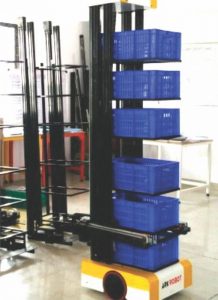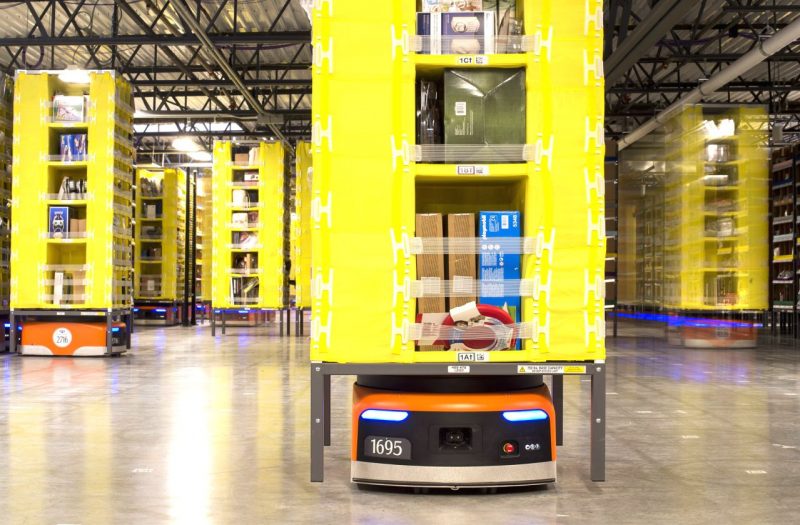ROBOTICS is changing India's warehouse landscape
The Flipkarts, the Amazons, the Snapdeals, the Myntras, the Jabongs, et al., have been changing the dynamics of not just the e-commerce sector in India, but also impacting other businesses—logistics, warehousing, supply chain management and multimodal transportation.
At the core of this change are rapid technological changes that are taking place, bringing about efficiency, scale, quick turnaround times, so crucial in transportation.
With artificial intelligence/robotics making faster inroads (thankfully no one is opposing automation, remember the days when bank employees in India were up in arms when computers were being introduced in the banking system) in various sectors, there is a new found dynamism in businesses.
As regards the warehouse sector, it is seeing a tectonic shift from ramshackled godowns with men carrying loads (it still is rampant but changes are taking place at least in the cities) to automated systems.
Massive warehouse space
As India shifts its development gears, deployment of automation is going to increase considerably. The growth of the warehousing industry itself is impressive, with warehouse space likely to touch 1,439 million square feet by the end of 2019, up from the present 909.5 million square feet.
The warehouse sector is expected to touch double digit by 2022. This is going to create not only employment opportunities but also large scale deployment of automation. No wonder, start-ups like Grey Orange, iFuture, Rivigo, etc., are doing well. Smart automation is what some of them offer.
GreyOrange expanding fast
Bengaluru-based Grey Orange is a multinational technology company that designs, manufactures and deploys advanced robotics systems for automation in warehouses, distribution and fulfilment centres.
Founded by BITS-Pilani graduates Samay Kohli and Akash Gupta, Grey Orange produces up to 1,500 robots a month and has research and development centres in India, the US and Singapore. Through the use of flexible automation, the power of artificial intelligence and exceptional customer service, Grey Orange works closely with businesses to recognize their needs, optimize the supply chain and enhance process efficiency.
Some of its clients include Flipkart, Myntra, Jabong and Pepperfry in the ecommerce realm and Aramex, DTDC, Delhivery and Mahindra Tractors in logistics. Its overseas customers include Hongkong based Kerry Logistics, Singapaore-headquartered Ninja Van, Japan’s Nitori, Trusco and Daiwa, Brazil’s Loggi and Indonesia’s Pos Indonesia.
Arkrobot and its clockwork efficiency
Another robotics company, also from Bengaluru making significant forays is iFuture Robotics. Set up recently in 2016, the company offers products and solutions with RoHS (restriction of hazardous substances) compliance and in-line with global safety standards. Its flagship product in the Indian market is Arkrobot which is a warehouse automation robot.
It is looking at entering the US and European markets where the rate of technology adoption is much higher. Arkrobot is a breakthrough in automatic order fulfillment technology, suited for ecommerce and other industries. Arkrobot offers solutions to clients ranging from startups to gigantic scale order fulfillment centres and automated warehouses.
In a business that requires storing and retrieving of huge number of product inventories, it is critical to implement a quick and efficient automation solution. It is widely known that manpower dependency leads to delays, quality issues, inaccurate picking and slower pick rates, hence, reduced throughput from a warehouse.
A rapidly growing business which is looking to scale up often faces this as a bottleneck when it comes to handling the surge of orders. The current process involves sending pick workers with a trolley to inventory locations, but it has many challenges. With Arkrobot the scenario changes where the goods are brought to the people and stored efficiently using data analytic such that the fastest selling items are always stored closest to the worker.
 The company states that is among the most advanced and efficient automatic storage and retrival systems (ASRS) in the world. Arkrobot is offered in the Indian market to industry segments such as e-commerce, automotive and logistics.
The company states that is among the most advanced and efficient automatic storage and retrival systems (ASRS) in the world. Arkrobot is offered in the Indian market to industry segments such as e-commerce, automotive and logistics.
The company’s founder Rajesh Manpat states that the market for robots is going to grow exponentially and the Indian factories and logistics firms are understanding the value of artificial intelligence.
Robotic palletization and more
Similarly, Noida-based Addverb Technologies provides robotic integration, warehouse automation and industrial internet of things by leveraging industry 4.0 technologies. Addverb provides customizable, modular, robust and innovative solutions to cater to the needs of an increasingly digital supply chain.
The company’s solutions include Robotic Palletization; Robotic Pick and Place; and Bin Plucking solutions. Robotic Palletization is used for the automation of production process, where the robots can pick case or cartons from the production line and arrange them on a pallet for storing or shipping.
These robotic solutions offer dramatically higher throughput and improve ergonomics of the workplace. Addverb provides robotic palletization solutions for cartons, crates, drums and containers. It has integration expertise over ABB, Kuka, Delta and Omron Adept Robots. Its Pick and Place solutions are ideal for high speed picking operations. The Bin Picking solutions can pick random objects kept in a tray /bin and load the arranged parts at the start of the production line. Addverb’s solutions are used in the pharma, automotive and food chain supply entities.
Logistics companies have started understanding the value of automation. The Vice President (Marketing) of Safexpress, Mr. Vineet Kanaujia has stated that the focus will be on establishing centralized warehouses with investments in technologies. Safexpress is banking on artificial intelligence for its next level of growth. So far, it has created 32 logistics parks in Hyderabad, Manesar etc and has a roadmap for more futuristics logistics hubs in smaller towns such as Coimbatore, Siliguri etc. A report by CBRE mentions that regions such as Gurgaon, Chennai, Hyderabad, Pune and Kolkata are witnessing launch of large scale supply in the ware-housing and logistics space.
According to the 2017 World Robotics Report, published by the International Federation of Robotics (IFR), by 2020 over 1.7 million new industrial robots will be installed in factories around the world.
Today, the strongest growth in robotics industry is in Asia – led by China as the world’s number one marketplace. It said robot supplies in the Americas will surge by 16 percent and in Europe by 8 percent.
Important drivers of this develop-ment are said to be that it leads to faster business cycles and its flexibility tailored to customer demand in all manufacturing sectors. ‘Robots offer high levels of precision and their connectivity will play a key role in new digital manufacturing environments,” states Joe Gemma, President of IFR.
In India, one of the drivers certainly is the ecommerce segment which is presently catering to only mega cities and when it forays in Tier II and III cities, the warehouse and logistics sectors will explode and only robotics will be able to handle the scale. And it is a myth that robotics is expensive.
In China alone there are said to be over 10 million robots and it is capitalizing on robotics to propel its place as number one as far as manufacturing is concerned. India, on the other hand, is a service oriented hub, but is now realizing the importance of manufacturing and to catch up with China, it has adopted artificial intelligence on a larger scale.
However, newer industry segments such as e-commerce, logistics, parcels, retail, etc., are giving birth to new opportunities for applications of robotics. It’s happening soon. The writing is on the warehouse wall.










